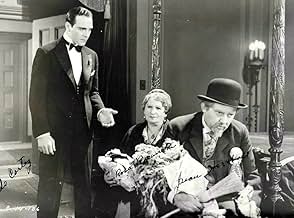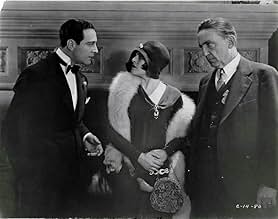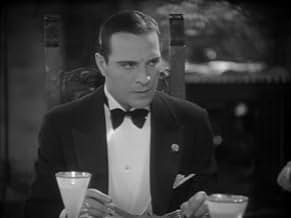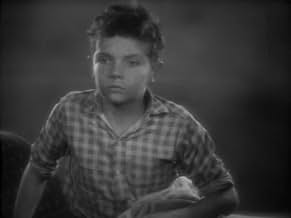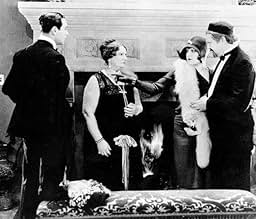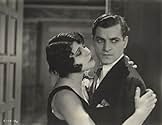Ajouter une intrigue dans votre langueSoap-opera about a social-climbing Jewish man and his old-world parents who are heartbroken by his rejection of them.Soap-opera about a social-climbing Jewish man and his old-world parents who are heartbroken by his rejection of them.Soap-opera about a social-climbing Jewish man and his old-world parents who are heartbroken by his rejection of them.
- Réalisation
- Scénario
- Casting principal
Syd Crossley
- Goldfish's Butler
- (as Sid Crossley)
Joe Bordeaux
- Crook
- (non crédité)
Ferike Boros
- Delancey Street Woman
- (non crédité)
Clarence Burton
- Police Desk Sergeant
- (non crédité)
Paul Ellis
- Crook
- (non crédité)
Ruth Feldman
- Market Woman
- (non crédité)
Otto Fries
- Tradesman
- (non crédité)
Julia Swayne Gordon
- Mrs. Striker
- (non crédité)
Donald Hall
- Minor Role
- (non crédité)
Leon Janney
- Eddie Lesser as a Boy
- (non crédité)
Julanne Johnston
- Irma Striker
- (non crédité)
Virginia Marshall
- Birdie Goldfish as a Girl
- (non crédité)
Avis à la une
This film is one of the rare surviving goat gland films, that is, it's a part talkie. The film was made in 1929, and although more financially or technically advanced studios had graduated to all-talking pictures by now, poverty row Columbia was just beginning to work with the new technology. As a result, the film is split rather oddly into silent and talking portions, and it goes back and forth between talking and silent throughout the picture. However, it is very well done in spite of this. They must have had some trouble with synchronization, because often the speaking portions will have the speaker turn his/her back to the camera so you can't see that the sound is out of sync. Also, there is a song performed at a distance in which you can clearly see that the singer's lips and the song are out of sync.
Enough about the poverty row qualifications. The film itself is an excellent Frank Capra work about a Jewish family in a poorer section of New York City. Don't expect the optimistic Capra of later years here, though. The film is surprisingly downbeat although the Capra themes of the importance of family and the evils of chasing riches for riches sake shine through.
The film opens with Julius Goldfish (Jean Hersholt) selling from his push-cart. Actually, he's loafing and talking with friends and ignoring the push-cart. His wife Tilda (Rosa Rosanova) scolds him about his loafing and says he'll never get ahead. Meanwhile their children do not get along with each other. Morris, their son, is always looking for ways to make money, even salvaging stuff from a burning building in order to have a fire sale. Birdie Goldfish (as an adult, Lina Basquette) and Eddie Lesser (as an adult, Rex Lease) are childhood sweethearts. Ma Goldfish is always building up Morris' industry and ingenuity, and Birdie is Pa Goldfish's pride and joy, although Ma and Pa love both children.
Time passes, and the adult Morris (Ricardo Cortez) builds up the push-cart into a thriving antique business and moves the entire family to Fifth Avenue, not so much because he wants his family with him, but because you feel he would be embarrassed to have it known that his family is living on the East Side. Morris even changes his name to Fish to leave his Jewish roots behind and be accepted in the gentile social circles of upper crust New York City. To this end he tries to control the lives of his parents and his grown sister, even shooting disapproving looks at his dad whenever he wears his prayer shawl. Eventually Morris turns his parents into museum pieces and pushes his sister out of the family when her marriage to Eddie embarrasses him socially. The end is bitter-sweet with a final scene that is hard to forget.
Highly recommended as a touching dawn of sound film and a showcase of Capra's talents during this technologically challenging era when so many others were making either stiffly acted static dramas or ludicrous musicals in this transitional year of all-talking pictures.
Enough about the poverty row qualifications. The film itself is an excellent Frank Capra work about a Jewish family in a poorer section of New York City. Don't expect the optimistic Capra of later years here, though. The film is surprisingly downbeat although the Capra themes of the importance of family and the evils of chasing riches for riches sake shine through.
The film opens with Julius Goldfish (Jean Hersholt) selling from his push-cart. Actually, he's loafing and talking with friends and ignoring the push-cart. His wife Tilda (Rosa Rosanova) scolds him about his loafing and says he'll never get ahead. Meanwhile their children do not get along with each other. Morris, their son, is always looking for ways to make money, even salvaging stuff from a burning building in order to have a fire sale. Birdie Goldfish (as an adult, Lina Basquette) and Eddie Lesser (as an adult, Rex Lease) are childhood sweethearts. Ma Goldfish is always building up Morris' industry and ingenuity, and Birdie is Pa Goldfish's pride and joy, although Ma and Pa love both children.
Time passes, and the adult Morris (Ricardo Cortez) builds up the push-cart into a thriving antique business and moves the entire family to Fifth Avenue, not so much because he wants his family with him, but because you feel he would be embarrassed to have it known that his family is living on the East Side. Morris even changes his name to Fish to leave his Jewish roots behind and be accepted in the gentile social circles of upper crust New York City. To this end he tries to control the lives of his parents and his grown sister, even shooting disapproving looks at his dad whenever he wears his prayer shawl. Eventually Morris turns his parents into museum pieces and pushes his sister out of the family when her marriage to Eddie embarrasses him socially. The end is bitter-sweet with a final scene that is hard to forget.
Highly recommended as a touching dawn of sound film and a showcase of Capra's talents during this technologically challenging era when so many others were making either stiffly acted static dramas or ludicrous musicals in this transitional year of all-talking pictures.
In this film, we see Morris Goldfish (Ricardo Cortez) bring success to his Jewish family, first as a young newspaper boy in New York City, and later a very successful, ambitious businessman. His mother (Rosa Rosanova) sees his skills, and encourages him, but the father and sister miss their old ramshackle home and old friends on the lower east side. This is one of the crossover films, where the soundtrack technology was invented while the film was being made. About halfway through the film, it switches from a silent film with title cards into a talking picture with sound track. Then it goes back to using title cards until the very end, with the final scene using sound again. Most of the cast had been making silent films for years, so they probably had to adjust to the sound portions. Good job by most of the cast. Papa Goldfish (Jean Hersholt) spends most of the film lamenting their new high-society lifestyle, and it gets annoying after a while. He won't even be happy when one of his kids gets engaged and married. We watch as Morris gets more and more successful, and he treats his own family very badly. Most of the story is told in dialogue, and after the big, grand opening, it looks like the rest was filmed in one room. This came out just before the big money crash of 1929, so we can assume that Morris will get what he deserves later, even if this story ends mostly on a sad note.
Younger Generation, The (1929)
** 1/2 (out of 4)
Early Capra melodrama has poor Jewish family taken out of the ghetto by their youngest son (Ricardo Cortez) who strikes it big. He moves his father (Jean Hersholt), mother (Rosa Rosanova) and sister (Lina Basquette) into a large house and expects them to do what he says and stay away from the "filth" they grew up around. Soon the three start to realize that money can't buy happiness but will the son learn this before it's too late? At this point in time Columbia was still a very small studio so they couldn't afford to go all in in terms of sound movies so this is another example of a silent with a few sound segments scattered throughout the film. I've always found this to be incredibly distracting but I think Capra does a great job at when to use the sound and I also think the quality of the recorded words is among the best I've heard from this era. Considering how poor the studio was it's rather shocking that some of the other studios early talkies didn't come off sounding better. With that said, there are some major problems with the film but for the most part it's a nice time filler that fans of the director will want to check out. The biggest problem is that even in 1929 this material was way too predictable. There's really not a single thing that happens in the film that you won't see coming from a mile away. The format pretty much follows every morality film that came before it and I just wish at some point Capra would have shaken things up just to keep us off guard or at least in some drama. It should come as no shock that Capra does a great job with what's here and manages to keep the film moving quite fast and he keeps it as entertaining as the screenplay will allow. The cast also keeps things moving nicely with their fine performances. Cortez would play this type of role countless times in his career and he always managed to do good with it. Hersholt clearly steals the film as the tortured father. In the end, this isn't the greatest film ever made but I think Capra did the most he could considering what he had to work with. I think those who like to search out these early talkies will find the quality here to be above average and will make one wonder why some of the bigger studios didn't have their stuff sounding as good.
** 1/2 (out of 4)
Early Capra melodrama has poor Jewish family taken out of the ghetto by their youngest son (Ricardo Cortez) who strikes it big. He moves his father (Jean Hersholt), mother (Rosa Rosanova) and sister (Lina Basquette) into a large house and expects them to do what he says and stay away from the "filth" they grew up around. Soon the three start to realize that money can't buy happiness but will the son learn this before it's too late? At this point in time Columbia was still a very small studio so they couldn't afford to go all in in terms of sound movies so this is another example of a silent with a few sound segments scattered throughout the film. I've always found this to be incredibly distracting but I think Capra does a great job at when to use the sound and I also think the quality of the recorded words is among the best I've heard from this era. Considering how poor the studio was it's rather shocking that some of the other studios early talkies didn't come off sounding better. With that said, there are some major problems with the film but for the most part it's a nice time filler that fans of the director will want to check out. The biggest problem is that even in 1929 this material was way too predictable. There's really not a single thing that happens in the film that you won't see coming from a mile away. The format pretty much follows every morality film that came before it and I just wish at some point Capra would have shaken things up just to keep us off guard or at least in some drama. It should come as no shock that Capra does a great job with what's here and manages to keep the film moving quite fast and he keeps it as entertaining as the screenplay will allow. The cast also keeps things moving nicely with their fine performances. Cortez would play this type of role countless times in his career and he always managed to do good with it. Hersholt clearly steals the film as the tortured father. In the end, this isn't the greatest film ever made but I think Capra did the most he could considering what he had to work with. I think those who like to search out these early talkies will find the quality here to be above average and will make one wonder why some of the bigger studios didn't have their stuff sounding as good.
10mmipyle
Watched "The Younger Generation" (1929) with Jean Hersholt, Lina Basquette, Ricardo Cortez, Rosa Rosanova, Rex Lease, Syd Crossley, and others. Concerning a Jewish family from NYC's lower east side. Directed by Frank Capra, this is silent with three short talkie sequences and a music and sound effects overlay otherwise. Hersholt is content in his surroundings, and loves to joke and laugh and be merry with fellow street hawkers, while his wife, Rosanova, wishes to move up and out of the life they're in. Son Cortez is already hawking newspapers and making money at a very young age, set to rise out of this life and onto Fifth Avenue. His sister, Basquette, is the apple of her father's eye, and she is enamored of a young harmonica player, Lease. He wishes to become a song writer. Cortez and he are at odds from early childhood. As years pass, Cortez becomes ultra successful and moves, taking his family with him, up to Fifth Avenue and tremendous wealth. But the happiness that was seemingly inherent in most of the family is now barred by a steely front of money and vapid social status. Eventually, Cortez actually snubs his family, calling them foolish servants in front of invited wealthy acquaintances so that he won't have to admit that they're his parents. His parents are shattered. The scene is shattering! The final scene, after several circumstances with Lease and Basquette in-between, is also shattering. How Cortez is situated at the end is monumentally shattering.
This moral fable is brilliantly executed by all involved. For me, this was the best performance I've ever seen Cortez give. I was bothered near the beginning with some of Cortez' hand placements which reminded me too much of stage performing and less of film acting. Other than that, the other performances are nothing short of great. The film, though possibly not for everybody, especially if you're turned off by moral fables, is revelatory for the period. It will instantly remind many of "His People" (1925) with Rudolph Schildkraut if any are familiar with that silent; they're nearly the same story, and, curiously enough, Rosa Rosanova is in both films. The film's Jewish circumscription is felt through and through, and Capra has obviously purposely made that choice. The ethnic aura makes the film even more compelling. The prayer that Hersholt prays near the end is supremely moving in context, and the resulting events are the threading of the needle sewing the coming tapestry.
Simply outstanding! The print was also nearly perfect, and the sound was actually well done for 1929. The talkie sequences don't necessarily add anything special to the film, but must have been very satisfying to audiences when the film was released. The sequences don't seem to be like other goat-glanded films of the era, but the sound is used in conjunction with the rest of the film. The final sequence before the very end scene is sound. The end scene itself, which is profoundly silent, is tremendously moving because of its silence. Highly recommended!
This moral fable is brilliantly executed by all involved. For me, this was the best performance I've ever seen Cortez give. I was bothered near the beginning with some of Cortez' hand placements which reminded me too much of stage performing and less of film acting. Other than that, the other performances are nothing short of great. The film, though possibly not for everybody, especially if you're turned off by moral fables, is revelatory for the period. It will instantly remind many of "His People" (1925) with Rudolph Schildkraut if any are familiar with that silent; they're nearly the same story, and, curiously enough, Rosa Rosanova is in both films. The film's Jewish circumscription is felt through and through, and Capra has obviously purposely made that choice. The ethnic aura makes the film even more compelling. The prayer that Hersholt prays near the end is supremely moving in context, and the resulting events are the threading of the needle sewing the coming tapestry.
Simply outstanding! The print was also nearly perfect, and the sound was actually well done for 1929. The talkie sequences don't necessarily add anything special to the film, but must have been very satisfying to audiences when the film was released. The sequences don't seem to be like other goat-glanded films of the era, but the sound is used in conjunction with the rest of the film. The final sequence before the very end scene is sound. The end scene itself, which is profoundly silent, is tremendously moving because of its silence. Highly recommended!
Morris Goldfish grew up on New York's poor Lower East Side with his Jewish family. His father is a fun loving guy with all his friends but they don't have much money. The kids accidentally burn down their home but Morris fights to save their valuables. He uses the same tenacity to be a successful business and moves the family to rich Fifth Avenue. His father is tired of the stuffy social climbing from Morris and not happy being no longer the head of the household while mother and sister Birdie are overjoyed with their rise in status. Morris changes him name from Goldfish to Fish.
This is my earliest Frank Capra film. It is silent except for some synchronized music and some talking sequences. It's always fascinating to see incremental advancements in technology. This mix of silent and sound is a real platypus. It actually affects the tone and the style of the movie. Of course, all of that is beyond the filmmaker's intention. It's just the sense from a modern viewer.
The father son relationship is pure Capra. It's a familiar Capra theme of money don't buy you happiness. I love the path that the movie is going on until Birdie and her boyfriend become the nexus of the plot in the middle. It's too much. Quite frankly, Morris can simply kick Birdie out for marrying poor. The whole crime is contrived. The movie does go back to the father son relationship which is a good thing. The big climatic moment in the lobby is both effective and flawed. There needs to be something more obvious for Morris to deny his parents. In the movie, he's already suppose to introduce his parents to the upper crust guests during the dinner. It needs an extra push. It needs his guest to say something derogatory about them being poor. It's a great moment but it needs a better reason for Morris. Overall, the movie gets a bit too melodramatic. This is a great film for Capra fans and they would be very familiar with the theme.
This is my earliest Frank Capra film. It is silent except for some synchronized music and some talking sequences. It's always fascinating to see incremental advancements in technology. This mix of silent and sound is a real platypus. It actually affects the tone and the style of the movie. Of course, all of that is beyond the filmmaker's intention. It's just the sense from a modern viewer.
The father son relationship is pure Capra. It's a familiar Capra theme of money don't buy you happiness. I love the path that the movie is going on until Birdie and her boyfriend become the nexus of the plot in the middle. It's too much. Quite frankly, Morris can simply kick Birdie out for marrying poor. The whole crime is contrived. The movie does go back to the father son relationship which is a good thing. The big climatic moment in the lobby is both effective and flawed. There needs to be something more obvious for Morris to deny his parents. In the movie, he's already suppose to introduce his parents to the upper crust guests during the dinner. It needs an extra push. It needs his guest to say something derogatory about them being poor. It's a great moment but it needs a better reason for Morris. Overall, the movie gets a bit too melodramatic. This is a great film for Capra fans and they would be very familiar with the theme.
Le saviez-vous
- AnecdotesFirst part-dialog sound film for Columbia Pictures and director Frank Capra. Both wanted to make an all-talking film, but equipped sound stages were at a premium at the time.
- GaffesWhen Birdie tells Eddie (via intertitle) that his song has been sold for $1000, he excitedly mouths the words "Five thousand?"
- Citations
Title Card: New York's Lower East Side--a melting pot, where the younger generation struggles to free itself from the old-world ideas of its fathers.
- ConnexionsFeatured in Frank Capra's American Dream (1997)
Meilleurs choix
Connectez-vous pour évaluer et suivre la liste de favoris afin de recevoir des recommandations personnalisées
Détails
- Durée1 heure 15 minutes
Contribuer à cette page
Suggérer une modification ou ajouter du contenu manquant

Lacune principale
By what name was Loin du ghetto (1929) officially released in India in English?
Répondre
